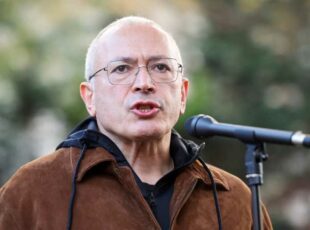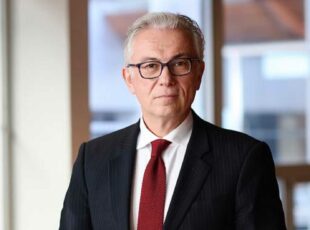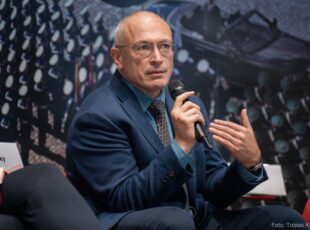“I think Putin’s in for a serious disappointment”
In this interview with Radio Svoboda, Mikhail Khodorkovsky talks about the “right turn,” emigration, Donald Trump, and the future of Russia.

Dmitry Volchek
In the coming decades, could Russia go down the path trodden by Belarus, Kazakhstan or Uzbekistan?
Russia is a country with far more European traditions than Kazakhstan, Uzbekistan and countries of that ilk. As regards Belarus, not only is Russia territorially bigger than the latter, it also has a larger population, so the authoritarian model is far less applicable in Russia than it is in Belarus.
It’s been functioning well enough for a good many years.
Not so! The government of any country can contribute 2 or 3 percentage points to the country’s economic growth, or it can achieve the reverse. […] We can see that the quality of governance in Russia has resulted in 2-3% less growth as compared to what might’ve been the case if the country were being governed properly. This means the model isn’t functioning well. In smaller countries, it functions better for obvious reasons: the authoritarian leader can establish a vertical of power, albeit power wielded over a comparatively small polity. But when you have a larger polity, the power vertical we so love to talk about in Russia becomes nothing more than a myth. There’s no vertical of power in Russia, the country isn’t controlled by the current government. What we have is an assortment of regional barons or siloviki [men in uniform]; each of them controls a separate scrap of land, and there isn’t a great deal of inter-coordination between them. Then there’s the Kremlin, which effectively barters with each of these barons over one and the same issue: you ensure my irremovability from power, and I, in turn, will give you this or that.
It’s hard to believe we could catch up with Europe now.
Catch up in what regard?
In regard to societal consciousness.
If we’ve been keeping pace for three hundred plus years, why would such a prospect seem so far-fetched now? Why wouldn’t we be able to bridge the gap?
Because of Stalin. Stalin wrecked so much that there’s no restoring it now.
I can’t agree that if we take the Greece of the “black colonels,” say, or if we take Franco’s Spain, Mussolini’s Italy, or Hitler’s Germany – I can’t agree that they really differ so radically from the Soviet Union under Stalin.
Yes, Stalin treated his own people even more harshly than did these others, but, looking at the big picture, that’s 1-2% of the population who were affected. […] If we take society as a whole, this was a painful blow indeed, but not a fatal one. After that there were the Sixtiers, there was a cultural upturn, and things carried on down the European road. Stalin killed millions of people, but today, if we’re talking political prisoners in Russia, their numbers could be in the hundreds, perhaps, but not in the thousands.
But the Bolotnaya Square case has succeeded in putting the frighteners on people, and now there’s fear in the air again.
There is. Yet we see that the regime can no longer permit itself to do even the things it did during the Brezhnev era.
Putin and his entourage pretty much regard me as their Enemy Number One
Perhaps it doesn’t even want to do them. Be that as it may, though, people are still afraid. Isolated individuals like Pavlensky may take a stand, yet people look at them with dumbfounded eyes and they fail to catalyse any kind of movement.
I can’t agree with that. You’re aware, of course, that Putin and his entourage pretty much regard me as their Enemy Number One. And when I decided that we’d take part in the election campaign, a precondition [for our candidates] was that they immediately had to announce they were running for election with the support of Khodorkovsky’s Open Russia. […] With conditions like that, I was told, no one’s going to bite. Yet we got 400 applications in the space of a couple of weeks. We whittled the applicants down to 25, of whom 24 made it to the election campaign stage and 19 to voting day itself. I find it hard to imagine something similar happening in Stalin’s time, not only in regard to what the regime would have green-lighted or prohibited, but also in regard to the psychological disposition of society. […]
You say they regard you as Enemy Number One – which means they must track your every move. Do you feel that you’re constantly under the microscope – listened in on, snooped upon?
That’s a little bit of a caricature, isn’t it? All this listening in and snooping – where are they going to get enough analysts to sort through all that raw data?
Oh, they do have enough! Although perhaps they’re bad analysts.
You shouldn’t overstate the case – the number of analysts they have is insufficient. Yes, we’re constantly being monitored, there can be no doubt about that. Furthermore, we don’t attempt to impede their monitoring activities because we’re familiar with the culture of our society: impede their efforts to monitor you and they’ll come to regard you as more dangerous than you actually are. […] I’ve a very philosophical attitude to this: right, you’re monitoring us, and what of it?
Litvinenko was monitored in London – and then poisoned. While Nemtsov was shot.
That’s a separate issue, though. Monitoring you in order to know what you’re up to isn’t the same thing as monitoring you with a view to taking violent action against you.
In certain circumstances, the first type of monitoring could morph into the second.
If you spend all your time thinking about this you might as well live in a bunker. I spent ten years in prison, which is basically a bunker, so to hell with them. At the end of the day, if they kill you, they kill you.
Can you walk around London without any worries, or do you not go out at all?
I simply don’t think about it. I just walk around London.
As everyone knows, Khodorkovsky is Vladimir Vladimirovich Putin’s personal prisoner
With security guards, or can you walk the streets just like that?
I just walk the streets. Why would I need a security detail? If our adversaries decide to kill me, no security detail is likely to prevent them from doing so. And if they do kill me, they’ll suffer the same reputational damage in either case, security or no security. As everyone knows, Khodorkovsky is Vladimir Vladimirovich Putin’s personal prisoner. If Vladimir Vladimirovich gives the order to kill me, I’ll have a hard time avoiding that fate.
You’ve written three articles about the “Left Turn”. We can now see that things are turning in the other direction. Brexit […], Trump in America, Marine Le Pen vying for power in France. Things are turning in the opposite direction…
Absolutely, but it only goes to show that the Euro-Atlantic community is following an ever-evolving trajectory of development. We were moving spiral-wise – and we still are. There was a “left turn” phase.
Which is to say that it’s now over?
It’s over, yes. We’re now witnessing the start of a “right turn” phase. Once we go through that, we may see another “left turn” in 5 to 7 years.
Trump is a phenomenon that exceeds the confines of the usual Democrat-Republican rivalry. I wonder if you agree with the Kremlin’s opinion that to some extent this is a victory for Putin, which they were banking on?
You and I know perfectly well they were banking on a Clinton victory.
As in, they were expecting it?
They were banking on a Clinton victory so they could say, There you go, that’s America, their elections are dishonest, they remain our perpetual enemy. That was a comfortable state of affairs for them. As I wrote a day prior to the vote, properly conducted elections in a democratic country differ from the elections we have in Russia in the sense that over there, there’s a day left to go and they’re still none the wiser as to who’ll win, whereas in Russia there’s still two years to go, yet everyone’s confident they could tell you the surname of the winner. A horde of Kremlin trolls immediately began bombarding me with messages: what d’you mean we’re none the wiser, everyone knows Clinton’s going to win tomorrow. Boom! Well, is there a difference between democratic elections and the spectacle we have in their stead? Now, of course, Putin is putting a brave face on a sorry business… But we know the American political system – that’s impossible.
Serving the interests of another country isn’t something the US president can allow himself to do
Serving the interests of another country isn’t something the US president can allow himself to do, much as he might want to do it (and I don’t know whether he’ll want to or not). In this regard, I think Putin’s in for a serious disappointment: his fundamental values are very different from Trump’s. […] Perhaps Trump does indeed want to appoint his judge to the Supreme Court, yet he’s aware that the court is independent from his administration, and I think it simply wouldn’t occur to Trump to issue commands to his country’s Supreme Court or to the judge he’s nominated to the position. Or take the independence of the press, for example. Yes, Trump can exploit social media, he may try to chastise reporters, but the idea of shutting down newspapers that’ve spoken out against him isn’t one he would entertain. So [Putin and Trump] have fundamentally different values.
Trump is an avid Twitter user. Do you produce your own social media content or is that something your media office is responsible for? Do you scroll through Facebook, reading posts and writing them, or is it a half-and-half sort of set-up?
It’s a half-and-half thing. I have Twitter and Facebook accounts which are exclusively for my own use, but I’ve also got an official Facebook account managed by my media team as well as several professionally managed websites. But we’re always up front about it – this is my personal stuff, and this was put together by the media team. I do indeed sometimes come across posts I find interesting, I’m really glad that social media allows you to engage in discussion, receive feedback, get a sense of what people are thinking.
I’ve a job to do – I’m not an old man yet and I enjoy doing the job I believe I have to do
You have the reputation of an iron-willed guy who works 24/7, lacks any weaknesses and doesn’t give himself any downtime whatsoever. Is that an image you enjoy cultivating? And what’s the reality?
I don’t think I personally radiate that kind of vibe. I’ve a large family, four children, two granddaughters, I enjoy spending time with them, I enjoy spending time at home. I’ve a job to do – I’m not an old man yet and I enjoy doing the job I believe I have to do. When I’m abroad, I do of course want to get back home as soon as I can, so I condense my schedule as far as that’s possible so I can return home sooner.
Where is home for you – is it London?
My home is where my loved ones are. It could be Moscow, it could be Switzerland, it could be America, it could be England. Home for me isn’t a physical situation – home is where my family is.
Your father has refused to leave Russia. Are you afraid for him? Do you feel that, in a way, he’s a hostage of sorts? They are, after all, capable of anything
As I told you at the very outset, I do believe, despite everything, that our country has changed. There are idiots around, of course, but […], nonetheless, people no longer exist in a paradigm of total war. In this sense, the exertions of pressure on my family were not so much systemic policy as […] isolated manifestations of someone’s stupidity and activism. My father has his lyceum to run, that’s his life’s work, and for reasons I can completely understand he doesn’t want to leave his life’s work behind. But hopefully he’ll come and visit over New Year’s.
What’s going on with your staff in Russia? Things had come to a head a bit, what with all the searches and interrogations, but what’s happening now?
It’s constant peaks and troughs. All our staff are under investigation in connection with the “mother” Yukos case, which has been dragging on since year dot […].
But Open Russia has new staff now…
That makes no difference to them. […] [The new staff have] been dragged into the old Yukos case. It makes no difference to them what case to use as a framework for […] conducting searches and so forth. Since there’s no rule of law in the country, it’s meaningless to discuss the logic behind this.
In a sense, then, all your Russia-based staff are hostages too?
They have certain occupational hazards, same as other journalists. I recently spoke to a Russian journalist from the BBC who was in Donetsk during the fighting. The conditions laid down for him by his employer are even tougher than those laid down by me, though there’s probably not a lot in it.
I’m convinced that sooner or later tens of millions of Russians will choose to steer a course towards a European-style rule-of-law state
Back in the day you claimed that there’d come a time when tens of millions of people would follow in your wake. You made that pronouncement in 2005, if memory serves. Do you still believe that’ll happen at some point
I’m convinced that sooner or later tens of millions of Russians will choose to steer a course towards a European-style rule-of-law state – a state with a regularly replaceable government, an independent judiciary, local self-government, and the like.
And will we live to see that day?
In reality, the choice has in large part already been made. Don’t ask people whether they’re for Putin or against him; ask them instead whether they want the judiciary to be independent, or whether they want local government to have enough of its own money to be able to resolve citizens’ problems without needing to wheedle it from the Ministry of Finance and paying the price for this in the form of election fraud and so forth.
They’ll say yes.
70% of people will say yes.
And what are they prepared to do for this cause?
So then the question arises: are you prepared to risk your lives for this, because, as we all know, this regime is ready to open fire – are you prepared to risk your lives to make this happen?
They’ll say no.
They’ll say no – the situation isn’t yet dire enough for us to be risking our lives in an effort to change it. If the bar in Russia was set at the same level as it is in Europe and America – as in, you simply turn up and you vote – we would’ve got rid of the current regime ages ago. As we know, in reality United Russia garnered the support of less than 15% of the electorate. But if we’re told that we’ll have to die in order to change things, well, no, we’re not prepared to do that, we’d rather grit our teeth and bear it. Which, in my opinion, is absolutely normal.
Authoritarian regimes aren’t able to perpetuate themselves
And they’ll keep grinning and bearing it forevermore.
Not forevermore, no, because, as we know, authoritarian regimes aren’t able to perpetuate themselves.
What about Belarus?
It’s not self-perpetuating – Lukashenko has just been living a long life.
Can’t Putin live a long life as well?
First of all, Putin isn’t Lukashenko, he’s still a legalist in the sense that he’s given himself two six-year terms. This doesn’t mean he can’t change the constitution again – he probably can – but ultimately I don’t think that’s going to happen. What we’ll get next in any case – he’s getting on now, after all – is a crisis of dual loyalty, because he’ll cease to be a guarantor of security for the younger generation of officials. Inter-elite conflicts are starting to brew – we can see evidence of them already; he’s trying to manage them as best he can, but they just keep growing and growing. I do think he’ll be fine in 2018, after which he’ll even try to emulate the Chinese model, though I don’t think anything will come of it. After that, he’ll start thinking about departing the scene.
But that’s still a very long time, how do we brave it out? People have been born under Putin and they’ve seen nothing but Putin.
What can you do? In this respect, I believe that when you’re presented with a choice between living a not-very-good existence, but at least one with a modicum of improvement, and risking your life for change – I believe that, given the current realities in Russia, the choice to wait it out, to accept the insufficient pace of prosperity growth and general economic growth in the country, to accept even a deterioration in prosperity – that, in a sense, is a conscious choice, and one that’s right for the country as a whole.
A full version of this interview was first published in Svoboda



